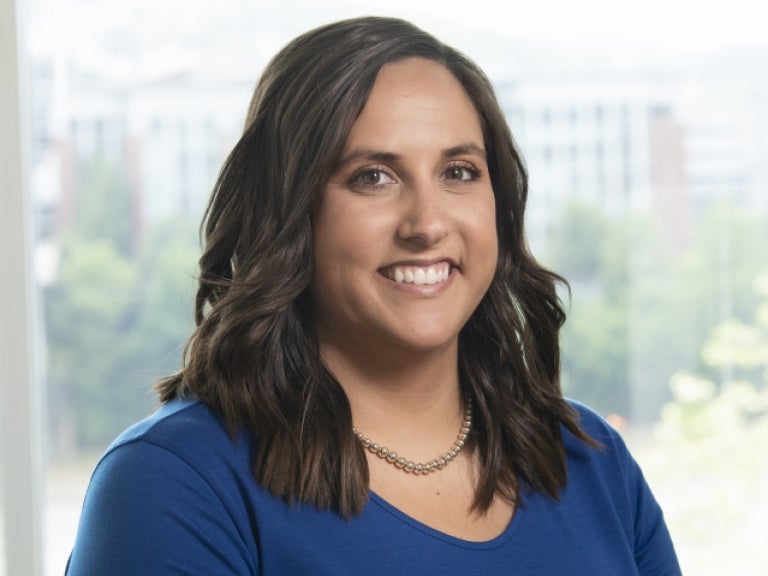
The University of Pittsburgh has always been home to Kelsey Voltz-Poremba. In 2011, Voltz-Poremba earned her BS in Health and Physical Activity with a concentration in Exercise Science from the School of Education before transitioning directly into the Master of Occupational Therapy (MOT) program at the School of Health and Rehabilitation Sciences. Upon graduation from the MOT program, Voltz-Poremba began her career as a clinical occupational therapist. Five years later, she returned to Pitt to complete her Doctor of Clinical Science (CScD) in Occupational Therapy.
Voltz-Poremba is currently an instructor in the Department of Occupational Therapy at the University of Pittsburgh teaching several courses across multiple degree programs. Outside of the classroom, she is involved with the SHRS Wellness Pavilion which is part of the Pitt Community Engagement Center in Homewood. This role includes working on initiatives that target health and wellness education across the lifespan such as Hope for Handwriting. These programs are all part of the entry-level Doctor of Occupational Therapy (OTD) fieldwork curriculum, encompassing in-person experiences and asynchronous community education.
Following Her Passion in Pittsburgh
Voltz-Poremba is passionate about helping people and she wants to foster that passion in others. She believes “everyone just wants to be treated with respect,” something she has taken to heart after spending the majority of her clinical career working in pediatrics and with adults with intellectual and developmental disabilities. This experience has also shaped her teaching style. Voltz-Poremba says it is “important to incorporate respect and integrity and encourage skills to promote independence.”
She strives to provide her students with autonomy to find their strengths and aims to build a supportive environment within the classroom. “I feel I can learn just as much from the students as they can from me,” she says.
Building Collaborative Relationships
Occupational therapists often work alongside other health care professionals to develop and implement treatment plans for their patients. Collaboration is ingrained in the culture of occupational therapy, so it should be an essential part of any occupational therapy program.
The University of Pittsburgh CScD in Occupational Therapy program promotes this type of environment through its curriculum and coursework. Dr. Elizabeth Skidmore, professor and chair, Department of Occupational Therapy, wants her instructors to build a culture of interprofessionalism and believes that it is at the foundation of every great leader.
Pitt’s CScD in Occupational Therapy program is a post-professional degree program so many students enter with clinical experience under their belt. The experience each student brings to the cohort is varied in both length and focus. Voltz-Poremba believes that “hearing about everyone’s experience and expertise is crucial in best understanding the concepts” being introduced and discussed throughout the program curriculum.
Fostering Future Leaders in Occupational Therapy
Voltz-Poremba has high hopes for her students, wanting them to “finish the program with a newfound confidence not only in their clinical abilities but their abilities to be leaders in the clinic and hospital system.
“The CScD program takes great clinicians and gives them the skills to be leaders,” Voltz-Poremba says. As someone who personally went through the program, she speaks from both sides of the experience.
The program’s emphasis on leadership and basing practice on solid evidence helps prepare students to become leaders in the profession. The Advanced Practice Certificate in Implementation of Evidence in Clinical Practice is just one example of the program’s focus on implementation and the future of occupational therapy. This one-of-a-kind certificate gives students the tools, knowledge and skills they need to implement evidence-based practice.
A Leader in Occupational Therapy Education
The University of Pittsburgh Department of Occupational Therapy is ranked nationally–third in the country–for its entry-level program. The Doctor of Clinical Science in Occupational Therapy is delivered 100% online and it attracts and serves top-ranked students all over the world.
Graduates of this program hold advanced positions in clinical and non-clinical occupational therapy settings. According to Voltz-Poremba, “You can develop advanced leadership skills, implement evidence into practice and transform both clients’ lives and the profession of occupational therapy with a CScD in Occupational Therapy from the University of Pittsburgh.”
